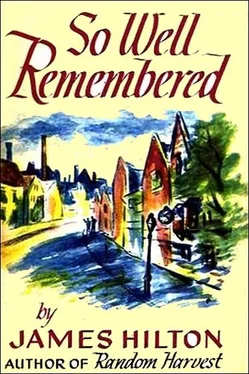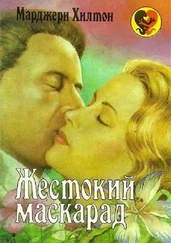Джеймс Хилтон - So Well Remembered
Здесь есть возможность читать онлайн «Джеймс Хилтон - So Well Remembered» весь текст электронной книги совершенно бесплатно (целиком полную версию без сокращений). В некоторых случаях можно слушать аудио, скачать через торрент в формате fb2 и присутствует краткое содержание. Год выпуска: 1945, Жанр: Проза, на английском языке. Описание произведения, (предисловие) а так же отзывы посетителей доступны на портале библиотеки ЛибКат.
- Название:So Well Remembered
- Автор:
- Жанр:
- Год:1945
- ISBN:нет данных
- Рейтинг книги:5 / 5. Голосов: 1
-
Избранное:Добавить в избранное
- Отзывы:
-
Ваша оценка:
- 100
- 1
- 2
- 3
- 4
- 5
So Well Remembered: краткое содержание, описание и аннотация
Предлагаем к чтению аннотацию, описание, краткое содержание или предисловие (зависит от того, что написал сам автор книги «So Well Remembered»). Если вы не нашли необходимую информацию о книге — напишите в комментариях, мы постараемся отыскать её.
So Well Remembered — читать онлайн бесплатно полную книгу (весь текст) целиком
Ниже представлен текст книги, разбитый по страницам. Система сохранения места последней прочитанной страницы, позволяет с удобством читать онлайн бесплатно книгу «So Well Remembered», без необходимости каждый раз заново искать на чём Вы остановились. Поставьте закладку, и сможете в любой момент перейти на страницу, на которой закончили чтение.
Интервал:
Закладка:
“Maybe. My father once said she said things not because they meant anything but to find out if they DID mean anything.”
George made no comment.
“And sometimes her mind seems full of words waiting for other words to set them off like fire-crackers.” The distant underground rumbling died away and all was silence. “Sounds as if it might be over… Where d’you think it was? Just tip and run on some little place—they do that, don’t they?” With difficulty the boy got up and walked to the window. “George—do you mind if I call you George?—George, I WISH I could be of some use —some REAL use—in this blasted country… If only I could fly again—but that’s out, and so far I can’t seem to settle to what’s in. I guess millions of us are going to feel like that after the war.” He moved restlessly. “How about a stroll? I can, if I’m careful.”
“Not till the all-clear sounds. Take it easy.”
“All right, all right. I’ll bet you make a good warden. When are you going back to that town of yours?”
“Tomorrow night, I hope.”
“So soon?”
“I’ll have finished my work in London and I’ve got plenty waiting for me at home.”
“They can’t do without you?”
“They could, but they mightn’t want to.”
“I’ll bet you’re a good mayor too. I’ll bet everything in that town runs like clockwork.”
“Oh, not so bad. I’d match it against any other place in England for being efficiently managed, if that’s what you mean.” George smiled to himself as he thought of the matter, then saw the other’s quizzical, slightly sardonic glance, and wondered if he were being baited. “Look here,” he continued, in some embarrassment, “I’m showing off too much… Aye, and I’d have been down that shelter too, but for showing off. Maybe that’s what kept us both here like a couple of fools.”
Charles shook his head, so George added: “Or maybe not in your case.”
“No, George. Oh God, no. If you MUST have a reason, it’s simply that I don’t give a damn what happens. To me personally, that is. I’m scared, and yet I don’t care. When you’ve seen a lot of your friends killed you can’t think you’ve survived by any special virtue of your own. Then why the hell HAVE you survived? And the next step in argument is why the hell should you go on surviving?”
George said quietly: “I don’t like to hear you talk like that.”
“It’s better than having you think it was bravery—or even bravado… Well, let’s discuss something pleasanter. That town of yours, if you like.”
“Provided it doesn’t bore you.”
“Not at all. I wouldn’t even mind seeing the place sometime.”
“Why don’t you then—sometime?”
It was half an hour before the all-clear sounded, and George was just in time to catch his train.
Of course they began to correspond again, and within a short time it happened that George was called to London for another official conference. This time it did not spread over a week-end, and he was far too conscientious to pretend it did; but by routing his return journey, with much extra discomfort, through Cambridge, he was able to spend a whole afternoon with Charles. He was delighted to note an improvement in the boy’s physical condition; he could use his legs more easily, and since he had been recommended to do so for exercise, the two spent part of the time strolling slowly about the Backs, which at that time of the year were at their loveliest.
Less reassuring to George was Charles’s state of mind, which still seemed listless and rather cynical, especially at the outset. He still questioned the value of anything he was doing at Cambridge, and George was too tactful to reply that even if it had no value at all, it was as good a way of passing a difficult time as any other. “But you like it here, don’t you?” George asked. “Or would you rather be at home?”
“I haven’t a home,” Charles answered, so sharply that George did not probe the point. But then the boy smiled. “I’m sorry—you must think I’m very hard to please. Of course Cambridge is all right, and I’ve really nothing to complain of. Everybody’s perfectly charming to me. The dons don’t mind whether I work or not—the whole atmosphere is timeless. It’s a bit frightening at first. And that air of detachment people have here. One of the St. Jude’s dons—a little wizened fellow who’s the greatest living authority on something or other—began talking to me quite casually the other day about the Channing case—took it for granted that I didn’t mind everyone knowing that my grandfather served a long sentence in jail. And of course I don’t mind—why should I? After all, my father didn’t exactly distinguish himself either—ever heard of Kemalpan? Well, I won’t go into that… and damn it all, I don’t care—why SHOULD I care?”
“Aye, why should you?” George interrupted. “You haven’t done so badly yourself—so far.”
“So far and no further, though—that’s what it looks like.”
George looked straight into the boy’s eyes. “You were talking about one of the dons here.”
“Oh yes—the one who reminded me that my grandfather was a crook. But he must have studied the trial pretty closely from the way he talked. He said John Channing was quite a pioneer in his way, and that his scheme for reorganizing the cotton industry was very similar to the one sponsored by the Bank of England twenty years later. ‘Unfortunate that your grandfather was tempted to borrow money by printing too many stock certificates. He should have become Governor of the Bank, then he could have printed the money.’” Charles imitated the high-pitched voice of the don. “So utterly detached —it made things rather easy between us afterwards. And then there’s another fellow—a very famous scientist—who remarked pleasantly to a small crowd of us at a tea-party—‘The Germans really do have the most God-awful luck—you almost feel sorry for them’ —but nobody turned a hair or thought anything of it, because everyone knows he’s working day and night on some poison-gas to kill the whole German nation if they start that game themselves.”
George answered: “You put your finger on a point, though, when you said ‘a very famous scientist’. Anyone not so famous could get into trouble if he talked like that at the Marble Arch to a crowd.”
“Oh, I don’t know. He might be booted out of the Park by a few bus- drivers. Probably nothing more… Because the English, after all, are a race of eccentrics. They don’t think it’s odd that people should be odd. And they always bear in mind the possibility that the lunatic view might, after all, be right. That’s what makes them tolerant of their enemies.”
George nodded. “Which is rather wise, because often it’s only from amongst your enemies that you can pick your friends.”
“Has that been your experience, George?”
“Aye—as a minority member on a Town Council where I’ve had more of my own way, I reckon, than most of the chaps on the other side with all their voting majority. But it’s taken time—and patience.”
“But what happens to the battle, George, if you win over all your enemies to help you fight it?”
“Why, I’ll tell you what happens—the battle’s over, and that’s what everybody’s after, isn’t it?”
“No, not exactly. What everybody wants is victory.”
“And everybody can’t get it. But you can make a lot of folks THINK they’ve got it. Remember Philip Snowden back in 1929—no, you’d be too young —anyhow, we all cheered like mad because he made France pay an extra million pounds of war debt! Think of it—one whole extra million pounds! The Fighting Yorkshireman! Wouldn’t have been easy to forecast how we’d all feel about the Fighting Frenchman a bit later!”
Читать дальшеИнтервал:
Закладка:
Похожие книги на «So Well Remembered»
Представляем Вашему вниманию похожие книги на «So Well Remembered» списком для выбора. Мы отобрали схожую по названию и смыслу литературу в надежде предоставить читателям больше вариантов отыскать новые, интересные, ещё непрочитанные произведения.
Обсуждение, отзывы о книге «So Well Remembered» и просто собственные мнения читателей. Оставьте ваши комментарии, напишите, что Вы думаете о произведении, его смысле или главных героях. Укажите что конкретно понравилось, а что нет, и почему Вы так считаете.










